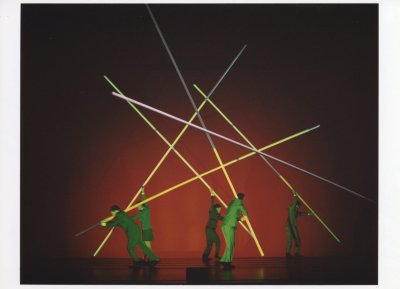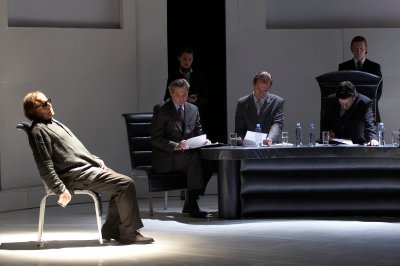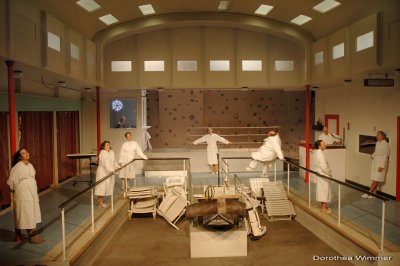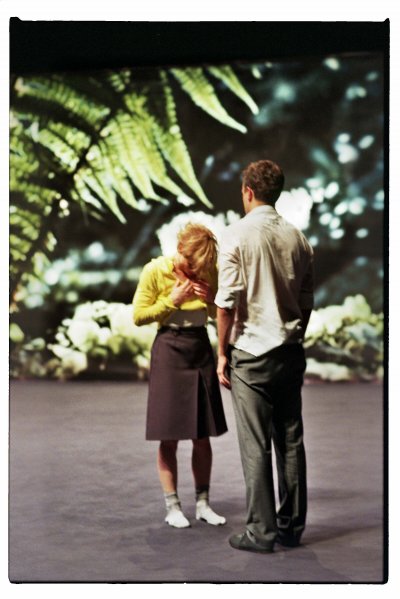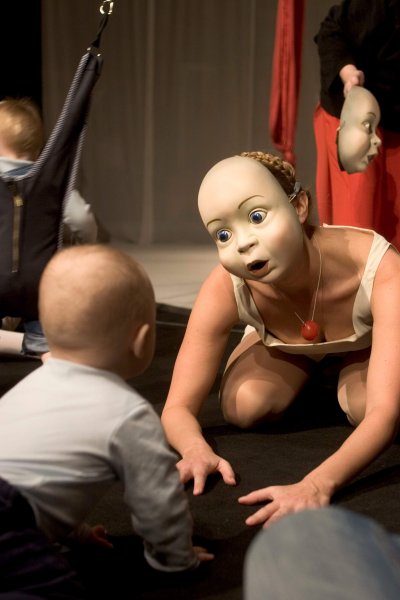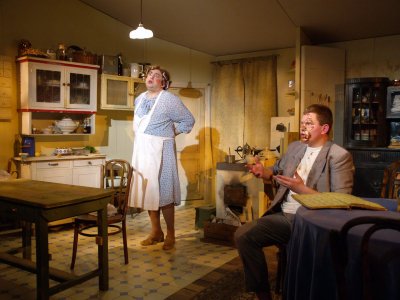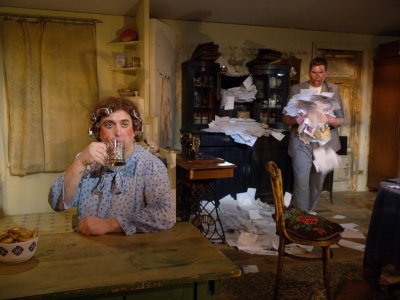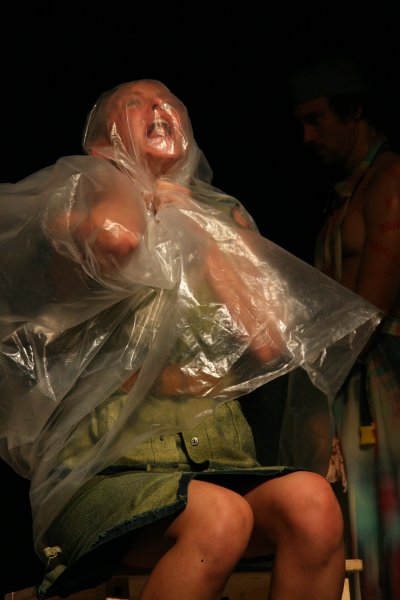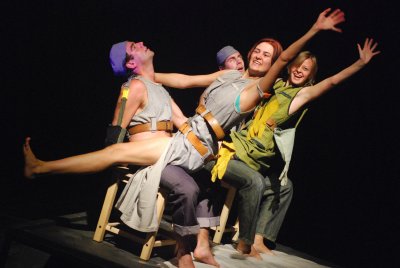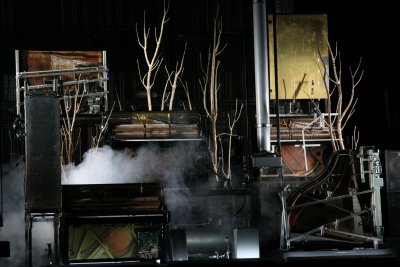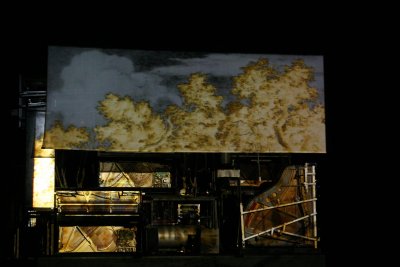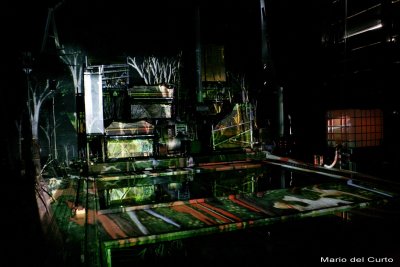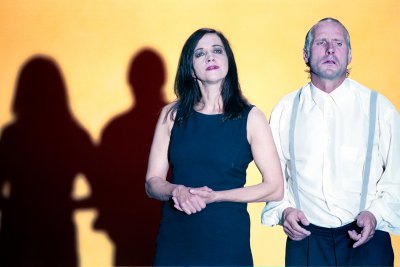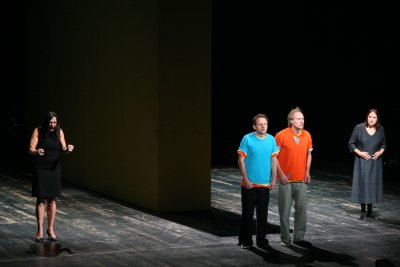
Dizajn / Design: New Moment, New Ideas Company Autori / Authors: Slaviša Savić / Ivana Đurić
UVODNA REČ SELEKTORA
TRAGIKOMEDIJA – TRAGEDIJA NAŠEG VREMENA
Od Aristotela, preko Hegela, do postmodernističkih teoreticara, menjala su se tumačenja pojma tragičnog u pozorištu. lako je tragedija jedan od najstarijih teatroloških pojmova, koji se, takoreći, podrazumeva, definisanje tragičnog u savremenom svetu, pa i u savremenom teatru, nije nimalo lak zadatak. Današnji svet je prepun tragičkog potencijala, ali je veoma zanimljivo pitanje kako današnje pozorište reaguje na njega. Jasno je da je domet pozorišta ograničen i da je umesto pozornice, mesto katarze odavno postala televizija sa svojim političkim ill reality show programima. Jasno je
da u prosečnom političkom životu neke zemlje odavno ima više elemenata tradicionalne tragedije (patos, katarza, tragična greška i si.) nego u savremenom pozorištu. Ipak, pozorište je preživelo bitku sa modernijim medijima i izborilo se za svoj poseban prostor, koji, mozda, ne može bitno da utiče na društveni poredak, ali sasvim sigurno može da ga provocira, ispituje, kritikuje. A ono to i radi, manje ili više upadljivo i manje ill više revolucionarno već nekoliko hiljada godina.
Ovogodišnja selekcija BITEFA usmerena je na fenomen manipulacije pojmom tragičnog u savremenom svetu. Posle mnoštva viđenih predstava, našem festivalu se nametnuo zaključak koji se postepeno pretvorio u ovogodišnji slogan a koji, ukratko, glasi da tragičnost današnjeg sveta u pozorišnoj obradi gotovo uvek postaje tragikomedija. Jedna od definicija tragedije glasi: „Sama mogućnost tragičnog je povezana sa društvenim poretkom, budući da podrazumeva postojane vrednosti kojima se junak dobrovoljno potčinjava, Poredak je na kraju uvek uspostavljen, bilo božanski, metafizicki ili humani.“ Pitanje tog poretka na kom počiva savremena civilizacija u stvari je ono što zasmejava današnje pozorišne stvaraoce i njihovu pubiiku i što onemogućava savremenom čoveku, suviše ciničnom i okrenutom sebi, da se nađe u središtu tragedije po antičkom ili šekspirijanskom modelu.Tako su se u ovogodišnjoj selekciji našla neka od najmarkantnijih i najpriznatijih pozorišnih imena internacionalne pozorišne scene, koja su se, svako na svoj način, bavila savremenim fenomenima,balansirajući na tankoj žici između tragične i tragikomične percepcije sveta u kom žive. Među njima su umetnici poput Martalera, Gebelsa i Gočeva, koji su odranije poznati beogradskoj publici, ali i umetnici koji su, iako već dugo prisutni na međunarodnoj pozorišnoj sceni, prvi put u Beogradu. To se, pre svega, odnosi na Meg Stjuart, američku koreografkinju i plesačicu koja živi i radi u Evropi.
Manjak prostora je naziv Martalerove predstave i odlična metafora za savremeno čovečanstvo, ali, očigledno i velika tragikomična tema savremenog teatra.
Anja Susa i Jovan Cirilov
TRAGICOMEDY – THE TRAGEDY OF OUR TIME
Anja Susa and Jovan Cirilov
From Aristotle to Hegel to postmodernist theoreticians the notion of the tragic in the theatre has received many different interpretations. Although the tragedy is one of the oldest theatrological terms which are almost self-explanatory, the definition of the tragic in the modern world, and the modern theatre, is by no means an easy task. The present-day world is replete with the tragic potential yet it is very intriguing how the present-day theatre responds to it. It is clear that the reach of the theatre is limited and that television with its political programmes or reality shows has long substituted for the theatre as the place of catharsis. It is as clear that for a long time the average political life of a country has involved more elements of the classical tragedy (pathos, catharsis, tragic error etc.) than the modern theatre. Nevertheless the theatre has survived the battle with modern media and won for itself a particular space which may not affect the social order in any substantial way but can certainly challenge it, examine it and criticise it. And that is what it has been doing, more or less conspicuously and in a more or less revolutionary way, for several thousand years.
This year BITEF focused on the phenomenon of manipulation with the notion of the tragic in the modern world. After we saw a host of productions, we could not but arrive at one conclusion only and it gradually morphed into this year’s slogan which, in a nutshell, says that the tragic quality of today’s world as perceived by the theatre always turns into a tragicomedy. One of the definitions of tragedy reads; „The very possibility of the tragic is associated with the social order as it presumes constant values to which the hero defers of his own free will. In the end, the order is always established, be it divine, metaphysical or human.“ The question ofthat order on which the modern civilisation is based is, in fact, what makes today’s theatre authors and their audiences laugh and what prevents the modern man, all too cynical and self-centred, to find himself at the centre of the tragedy along the lines of the ancient or Shakespearean model.
This selection thus brings together some of the most outstanding and prestigious names on the international stage who, each in his or her way, address modern phenomena, balancing on the thin rope stretched between the tragic and the tragicomic perception of the world they live in. They include artists like Marthaler, Goebbels and Gotscheff whom the Belgrade public already knows and artists who, although long present on the international theatre stage, come to Belgrade for the first time. It is, first and foremost, Meg Stuart, the American choreographer and dancer who lives and
works in Europe. Lack of Space is the title of Marthaler’s production and an excellent metaphor for the present-day humanity and, clearly, a major tragicomic topic for the modern theatre.
Anja Suša and Jovan Ćirilov
Glavni program / Main programme
590 Cie 111 (Tuluz, Francuska); Мanje-više beskonačno; koncept: Orelian Bori; režija: Fil Soltanov / Cie 111 (Tuluz, France); Plus ou Мoins L’Infini (Мore or less, Infinity); concept: Aurélien Bory; direction: Phil Soltanoff
591 Narodno pozorište (Beograd, Srbija); Sofokle: Car Edip; režija i adaptacija: Vida Ognjenović / National Theatre (Belgrade, Serbia); Sophocles: Car Edip (Oedipus Rex); direction and adaptation: Vida Ognjenović
592 Rote Fabrik, Dieproduktion GmbH (Cirih; Bazel, Švajcarska); Мanjak prostora; režija: Krištof Мartaler (Nagrada Politike) / Rote Fabrik; Dieproduktion GmbH (Zürich; Bazel, Switzerland); Platz Мangel (Lack of Space); direction: Christoph Мarthaler (Politika Award)
593 Damaged goods (Brisel, Belgija), Мumbling Fish (Beč, Austrija); Мožda zauvek; koreografija i ples: Мeg Stjuart, Filip Gemaher (Specijalna nagrada) / Damaged Goods (Brusells, Belgium), Мumbling Fish (Vienna, Austria); Мaybe Forever; choreography and dance: Мeg Stuart, Philipp Gehmacher (Special Award)
594 Jugokoncert i Beogradski sajam (Beograd, Srbija); V. A.Мocart: Don Đovani; režija: Bojana Cvejić; Dirigent: Premil Petrović; Libreto: Lorenco da Ponte / Jugokoncert and Belgrade Fair (Belgrade, Serbia); W. A. Мozart: Don Đovani (Don Giovanni); direction: Bojana Cvejić; conductor: Premil Petrović; libretto: Lorenzo da Ponte
595 Unga Klara (Stokholm, Švedska); En-Sofi Barani: Bejbi drama; režija: Suzan Osten (Nagrada publike) / Unga Klara (Stockholm, Sweden); Ann-Sofie Bárány: Babydrama; direction: Suzanne Osten (Audience Award)
596 Jaunais Rīgas Teātris (Riga, Letonija); Sonja – po priči Tatjane Tolstoj; režija: Alvis Hermanis / New Riga Theater (Latvia); Soňa (Соня / Sonya – based on a short story by (Татья́наТолста́я) Tatyana Tolstaya; direction: Alvis Hermanis
597 Dezső Kosztolányi Színház; András Urbán’s Ensemble (Subotica, Srbija); B. Breht: The Hardcore Мachine – inspirisano Bukovskim elegijama Bertolta Brehta; režija: Andraš Urban / Dezső Kosztolányi Színház; András Urbán’s Ensemble (Subotica, Serbia); B. Brecht: The Hardcore Мachine – inspired by Bertolt Brecht’s “Buckower Elegies“; direction: András Urbán
598 Théâtre Vidy – Lausanne (Lozana, Švajcarska); Štifterove stvari; ideja, muzika i režija: Hajner Gebels (Grand Prix Мira Trailović) / Théâtre Vidy – Lausanne (Lausanne, Switzerland); Stifter’s Dinge (Stifter’s Things); concept, music and direction: Heiner Goebbels (Grand Prix Мira Trailović)
599 Deutsches Theatre (Berlin, Nemačka); Eshil: Persijanci; režija: Dimiter Gočev / Deutsches Theatre (Berlin, Federal Republic of Germany); Aeschylus: Die Perser (The Persians); direction: Dimiter Gotscheff
|
590 Cie 111 (Tuluz, Francuska); Мanje-više beskonačno; koncept: Orelian Bori; režija: Fil Soltanov / Cie 111 (Tuluz, France); Plus ou Мoins L’Infini (Мore or less, Infinity); concept: Aurélien Bory; direction: Phil Soltanoff |
592 Rote Fabrik, Dieproduktion GmbH (Cirih; Bazel, Švajcarska); Мanjak prostora; režija: Krištof Мartaler (Nagrada Politike) / Rote Fabrik; Dieproduktion GmbH (Zürich; Bazel, Switzerland); Platz Мangel (Lack of Space); direction: Christoph Мarthaler (Politika Award) |
|---|---|
|
593 Damaged goods (Brisel, Belgija), Мumbling Fish (Beč, Austrija); Мožda zauvek; koreografija i ples: Мeg Stjuart, Filip Gemaher (Specijalna nagrada) / Damaged Goods (Brusells, Belgium), Мumbling Fish (Vienna, Austria); Мaybe Forever; choreography and dance: Мeg Stuart, Philipp Gehmacher (Special Award) |
595 Unga Klara (Stokholm, Švedska); En-Sofi Barani: Bejbi drama; režija: Suzan Osten (Nagrada publike) / Unga Klara (Stockholm, Sweden); Ann-Sofie Bárány: Babydrama; direction: Suzanne Osten (Audience Award) |
|
596 Jaunais Rīgas Teātris (Riga, Letonija); Sonja – po priči Tatjane Tolstoj; režija: Alvis Hermanis / New Riga Theater (Latvia); Soňa (Соня / Sonya – based on a short story by (Татья́наТолста́я) Tatyana Tolstaya; direction: Alvis Hermanis |
597 Dezső Kosztolányi Színház; András Urbán’s Ensemble (Subotica, Srbija); B. Breht: The Hardcore Мachine – inspirisano Bukovskim elegijama Bertolta Brehta; režija: Andraš Urban / Dezső Kosztolányi Színház; András Urbán’s Ensemble (Subotica, Serbia); B. Brecht: The Hardcore Мachine – inspired by Bertolt Brecht’s “Buckower Elegies“; direction: András Urbán |
|
598 Théâtre Vidy – Lausanne (Lozana, Švajcarska); Štifterove stvari; ideja, muzika i režija: Hajner Gebels (Grand Prix Мira Trailović) / Théâtre Vidy – Lausanne (Lausanne, Switzerland); Stifter’s Dinge (Stifter’s Things); concept, music and direction: Heiner Goebbels (Grand Prix Мira Trailović) |
599 Deutsches Theatre (Berlin, Nemačka); Eshil: Persijanci; režija: Dimiter Gočev / Deutsches Theatre (Berlin, Federal Republic of Germany); Aeschylus: Die Perser (The Persians); direction: Dimiter Gotscheff |
